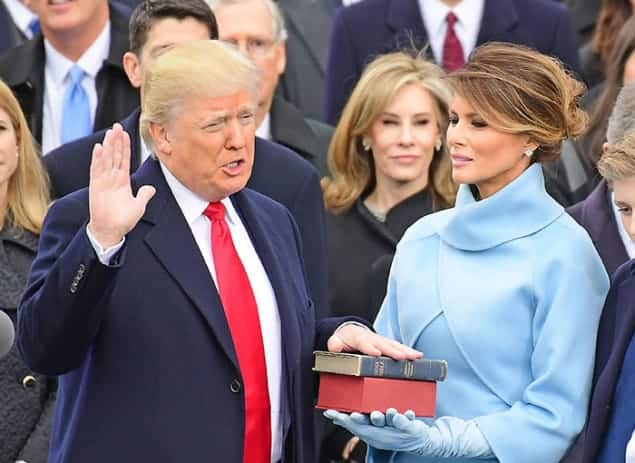
Rick Perry, the former governor of Texas, who has been nominated as the Trump administration’s energy secretary, once expressed his desire to eliminate the Department of Energy (DOE). Scott Pruitt, the nominated head of the Environmental Protection Agency (EPA), sued the agency 14 times during his time as attorney general of Oklahoma. Donald Trump’s choice as secretary of the interior, Republican congressman Ryan Zinke from Montana, recently asserted that human-caused climate change, although “not a hoax”, was “not proven science, either”. And just nine days before his inauguration, Donald Trump appointed a proponent of the discredited link between children’s vaccines and autism to head a government commission on the safety and scientific integrity of vaccines.
“The appointments make one scratch one’s head,” says Rush Holt, the physicist and former Congressional Representative who is chief executive of the American Association for the Advancement of Science (AAAS). “Even though some are not outsiders, they are idiosyncrats or iconoclasts.” These nominees had provided few hints about the administration’s likely policies related to science and technology. Yet at a Senate hearing this month, Perry did express regret that he had called for the DOE to be abolished. He also noted that he would base decisions at the DOE on “sound science” and “protect the men and women of the scientific community from anyone who would attack them, no matter what their reason may be”.
Nevertheless, the overall lack of clarity has caused significant angst within the US scientific community as Trump takes up office. “Since the election, the level of uncertainty and even anxiety has increased,” says Holt. “The president continues to leave everybody guessing as to what he will do.” Holt adds that many of Trump’s statements are cryptic, “all over the place” and sometimes seem contradictory, leaving it hard to know what he actually means. “Combine that with his appointments, at least for science, and it’s almost bewildering, the uncertainty that is there,” he adds.
Poorly prepared
Adding to the uncertainty are the actions – or lack of them – by members of the Trump transition team. “The word from all the science-related agencies is that the transition team has not been very engaged,” Holt says. “It seems to me that the transition process will provide the least preparation for the incoming officers of any administration in many, many years.”
A major issue that worries the scientific community is the Trump-transition-team’s failure to provide any indication of its intentions on appointing a science adviser and making use of the Office of Science and Technology Policy that the adviser heads, despite receiving a letter advocating a fast appointment from the leaders of 29 scientific societies. Indeed, members of the community have sent several letters to the transition team and individuals, expressing their concerns about the future of science-related issues.
Climate-change nixed
The community’s strongest concern focuses on climate change – especially given that all references to climate change were removed from the official White House website within minutes of Trump’s inauguration. Indeed, Trump is noted for once accusing climate change of being a “hoax” set up by China to gain business from the US. Although he has slightly modified his attitude since, his transition team surprised the community by asking the DOE for the names of individuals involved in the Paris agreement and related issues. Department managers refused the request, fearing that the new administration might target those individuals in some way. “Spokespeople said there was no intention to harass them,” Holt says. “But the fact that the information was sought has left climate scientists in government very nervous.”
That feeling is hardly reduced by the line-up of nominees to head the cabinet departments mainly involved with climate matters. It is heavily slanted to individuals with strong connections to the fossil-fuel industry and those opposed to environmental controls. For example, over the past seven years, Pruitt has been suing the EPA to block regulations intended to improve the cleanliness of the environment. His reasoning is that such issues should not be handled by the federal government.
“Some claim Pruitt opposes clean air and water. This could not be further from the truth,” wrote a group of conservative organizations supporting his candidacy. “He understands that many of the nation’s challenges regarding clean air and water are best met at the state and local level.” However, environmental groups do not accept Pruitt or his reasoning. Indeed, the Environmental Defense Fund, a relatively moderate organization, has announced its opposition to Pruitt – the first such action in the fund’s 50 year history.
Increased drilling
Zinke – the nominee for secretary of the interior – is a geologist who spent much of his career in the US Navy. He has had little exposure to the protection of public lands and waters that the department oversees and, like Pruitt, has expressed support for US states to gain control of land currently under the jurisdiction of the federal government. Environmentalists fear that he might agree to increased drilling for oil and gas on those lands. Sally Jewell, the last head of the interior department under president Obama, in contrast, blocked such activity and advocated the development of renewable energy sources.
Even though some are not outsiders, they are idiosyncrats or iconoclasts
Rush Holt, AAAS
Meanwhile, former-Texas-governor Perry’s best known connection to the DOE is his failure to remember it as one of the cabinet departments he wanted to eliminate during a debate in 2012, when he ran unsuccessfully for the Republican presidential nomination. Intriguingly, Perry is not the first DOE nominee to have wanted to discard the department. Spencer Abraham, president George W Bush’s first energy secretary, had voted to do so when representing Michigan in the Senate; the department survived. Given his roots in Texas and his denial of the role of humans in climate change, Perry is expected to give strong support to the oil and gas industries. On the other hand, proponents of renewables point out that Texas emerged as a powerful source of wind power during Perry’s governorship.
Nuclear responsibilities
Dealing with energy sources and climate change represents just one facet of the DOE’s remit. About 60% of its budget goes to the National Nuclear Security Administration, which oversees the US stockpile of nuclear weapons. The expertise informed by that work played a major role in the agreement reached by the Obama administration and its allies to reduce Iran’s stockpile of enriched uranium. Throughout the election campaign, Trump asserted that the agreement was “the worst deal ever negotiated” and said dismantling it was his “number one priority”.
However, a group of senior scientists – organized by physicist and policy-maker Richard Garwin – disagree. They penned a letter to the then-president-elect asserting that the deal “has increased to many months, from just a few weeks, the amount of time that Iran will take to develop a single nuclear weapon”. The 37 signatories include Nobel laureates and senior figures in nuclear policy such as Siegfried Hecker and Sidney Drell (who signed the letter shortly before he died in late December).
The DOE also oversees the country’s 16 national laboratories. In one of his last appearances as outgoing energy secretary, Ernest Moniz introduced the first annual report to Congress on the state of the labs. While identifying areas for improvement, the report notes that collectively “they have pursued actions to substantially improve the laboratory system”. Together, the report continues, “they will continue to work to maintain and develop the most comprehensive network of its kind – a system of national laboratories that can effectively tackle long-term, critical R&D challenges for the nation.”
Obama’s legacy
As for efforts begun by the Obama administration to encourage clean power, they – for the time being – will continue. The $1bn Petra Nova carbon-capture plant – a joint venture between a Houston power company and an oil and gas operation with some government support – started operation last month. Completed on time and under budget, the plant will pump the carbon dioxide (CO2) created when it burns coal to an oilfield 130 km away. The CO2 will be injected into wells to increase the recovery of oil, with the plant being economically viable when the price of oil reaches $50 per barrel.
But as with other energy issues, environmentalists fear that the incoming Trump administration, with its negative attitude to global warming, may end support for carbon capture. Equally at risk is a new approach to coal leases on federal lands suggested by former interior secretary Jewell in early January. The recommendations could make it more expensive for companies to take on the leases.
There is, though, one agency that seems likely to prosper under the new administration: NASA. Some of president Trump’s advisers have spoken enthusiastically about lunar colonies and manned missions to orbit Mars. However, the team has also made clear its disapproval of the agency’s efforts to study global warming and other aspects of Earth science.
Holt now calls on scientists to use the switch to a new administration to their own advantage. “The current transition is an excellent opportunity for young scientists and engineers to engage now with the public and many different audiences, to explain the work you do and why it’s important for expanding human knowledge and improving people’s lives,” he says.



